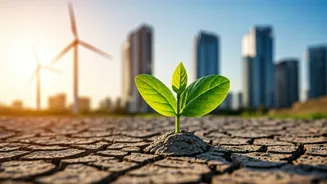Defining Sustainable Economies
Sustainable economies represent a balance between economic growth, social well-being, and environmental protection. This intricate model involves efficient
resource management, minimizing pollution, and ensuring that economic activities do not compromise the ability of future generations to meet their own needs. Key components include renewable energy adoption, responsible consumption and production patterns, and robust social safety nets. The concept prioritizes long-term viability over short-term gains, aiming for economic systems that are both resilient and equitable. It's a holistic approach, considering factors such as carbon emissions, waste management, and social impact indicators to create a system that benefits both the present and the future.
India's Economic Performance
India's ranking in the top 10 sustainable economies for 2025 signifies notable achievements in its economic practices. The country has been gradually integrating sustainable practices into its economic strategies. Investments in renewable energy sources, such as solar and wind power, are significant contributors to the nation's improved sustainability profile. Furthermore, the Indian government has been implementing policies promoting eco-friendly manufacturing and waste management, creating a positive shift. Various initiatives are directed at enhancing energy efficiency and reducing carbon footprints across sectors. These measures, combined with a growing focus on social equity, contribute towards creating a robust and environmentally conscious economic structure, setting the stage for long-term progress.
Global Comparisons & Analysis
Comparing India's sustainable economic strategies with those of the US, UK, and China reveals a range of approaches and priorities. The United States, with its advanced technological infrastructure and robust market, focuses on innovation and energy efficiency. The United Kingdom emphasizes policy-driven initiatives, particularly in climate change and carbon reduction. China, a major player in global manufacturing, is investing heavily in green technology and renewable energy, aiming to balance rapid industrial growth with environmental protection. India's strategy incorporates elements of all these approaches, with a specific focus on balancing economic growth with social inclusion and environmental stewardship. The analysis reveals how each nation's unique circumstances shape its sustainability policies and highlights the varied paths to achieve sustainable economic development.
Key Factors for Sustainability
Several factors are crucial to determining a nation's ranking in sustainable economies. Firstly, the adoption of renewable energy sources is essential, which reduces dependence on fossil fuels and lowers carbon emissions. Secondly, effective waste management and recycling programs minimize environmental pollution. Thirdly, implementing circular economy models promotes resource efficiency. The fourth factor involves investing in green infrastructure, such as sustainable transportation and buildings. Fifth, robust environmental regulations and policy frameworks provide the necessary guidelines and incentives for businesses to adopt sustainable practices. Finally, social aspects like promoting education and healthcare also impact a nation's capacity for sustainable economic development. These elements, working in combination, contribute to a stronger and more sustainable economic environment.
Challenges & Future Outlook
Despite progress, challenges remain in enhancing India's economic sustainability. Key concerns involve the transition to clean energy, where investment and infrastructure development need acceleration. Furthermore, addressing pollution in densely populated urban areas, where effective waste management is essential. Another hurdle involves improving resource efficiency in manufacturing and agriculture, requiring technological advancements and revised practices. The future outlook for India depends on the ability to overcome these challenges. Continued efforts in renewable energy, improved environmental regulations, and investments in sustainable technologies can drive further progress. The nation's ability to maintain its commitment to sustainable development will ultimately determine its long-term economic prosperity and its position on the global stage, solidifying its status as a sustainable economy in 2025 and beyond.






















